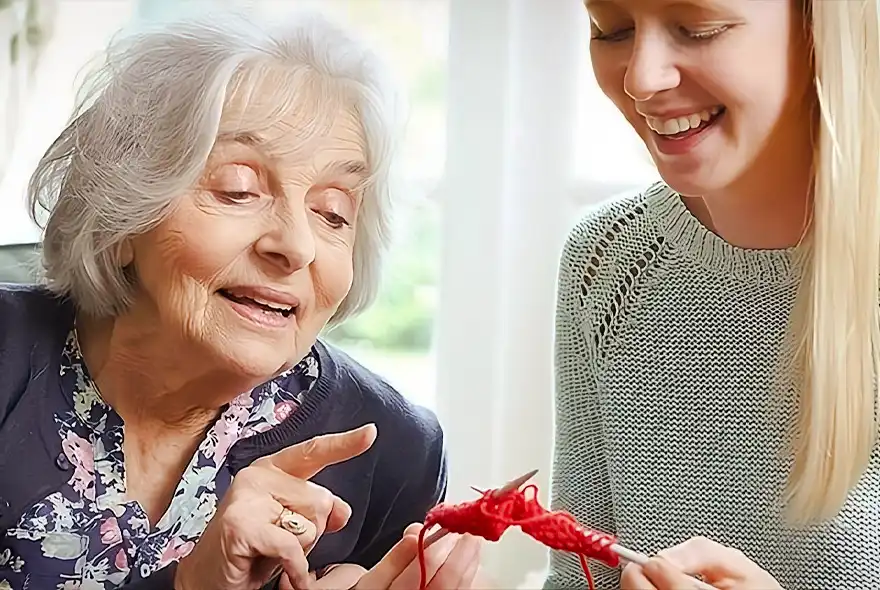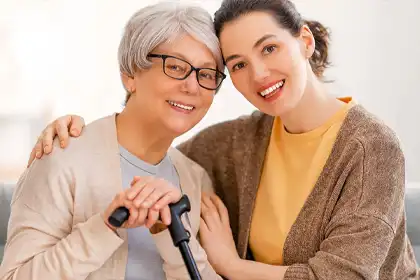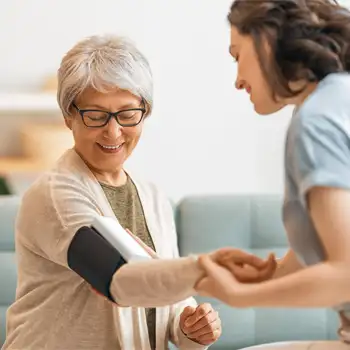At Allevia Home Care, we understand our clients want to be as independent as possible. We all enjoy being able to get dressed, walk, and overall take care of ourselves independently. Unfortunately, as we age or suffer a disability, some simple tasks can become difficult or even impossible to manage on our own.
Most of the time, people have to give up simple routine activities because they can’t take care of it themselves. However, with Allevia’s personal care assistance, this can easily be solved.

Defining Personal Care Services
Personal care services encompass hands-on assistance vital for daily activities that an individual may struggle to perform independently. Often termed as Activities of Daily Living (ADLs) or Instrumental Activities of Daily Life (IADLs), these services play a pivotal role in enabling individuals to maintain residence in their homes rather than transitioning to assisted living facilities or nursing homes.
Personal care options can be tailored to seniors who want to remain in their own homes, or to disabled adults who want to be independent, but just need some help. These options are safer and more effective than group living, because they enhance the quality of life by helping maintain autonomy.
What Do Personal Care Aides Provide
These services span a wide spectrum of both ADLs and IADLs, addressing fundamental yet crucial needs essential for safe independent living.
“Personal care” involves every aspect a person requires to live a comfortable, dignified life. To ensure clients can live safely and independently, our standard services include:

- Bathing
- Dressing and undressing
- Meal Preparation
- Grooming
- Mobility assistance
- Toileting/hygiene assistance
- Eating
- Light Housework
- Companionship and Socialization
- Medication reminders
When to Consider Home Care Services
Recipients of in-home personal care services predominantly encompass the elderly, adults with disabilities, patients recovering from injuries or illnesses, and those managing chronic conditions such as dementia and Alzheimer’s. Unlike home health care services, personal care services are non-medical in nature and often don’t necessitate formal licensing or doctor’s prescription.
You may want to consider personal care if your loved one:
- Struggles with chronic conditions affecting their ability to live independently
- Has difficulty with activities of daily living like dressing, bathing, etc.
- Should not be left alone for long periods of time
- Needs assistance managing health conditions or medications
- Needs someone to go with them to medical appointments, or when they run errands
Benefits of Personal Care Services
Opting for in-home personal care offers several advantages over institutional care, including the ability to sustain independent living in a familiar environment, cost-effectiveness compared to assisted living or nursing homes, tailored care meeting specific needs, and a notable enhancement in quality of life, fostering a sense of independence and strong caregiver-client relationships.
An Allevia Home Care representative can meet with you and your loved one to discuss their needs and make thoughtful recommendations for care. We develop customized care plans that provide clients the support they need while allowing them to maintain their independence.
If you have a relative in need of daily assistance, contact Allevia Home Care. We can bring comfort to your loved one and peace of mind to you. Our compassionate personal care assistants can help your family manage this difficult situation with respect and care. Please don’t hesitate to reach out.
Frequently Asked Questions
What is the importance of personal care for seniors’ well-being?
Personal care is crucial for seniors as it helps them maintain their dignity, independence, and overall well-being. It can be challenging for seniors to accept help with personal tasks after a lifetime of managing independently. However, personal care can create a safe environment when dealing with personal tasks, listen to the wishes of the elderly patient, adapt to the preferences and needs of the patient, prepare the medicines and other things that support wellness, promote the quality of life of seniors, people with disabilities, and those suffering from illnesses in need of home care, and is a part of healthy living. Personal care also promotes good mental health, helps avoid skin issues, keeps up with foot care, prevents dental problems, stops body odor, maintains a healthy appearance, and helps detect health complications.
Does Medicare Or Health Insurance Pay For In-Home Care?
Medicare and traditional health insurance pays for very limited amounts of care, for very brief periods of time. Companion care and non-medical home care are typically not paid for by Medicare or traditional health insurance.
How can communities contribute to the well-being of elderly residents without caregivers?
Communities play a vital role in supporting elderly residents who lack caregivers. Ways in which communities can contribute to their well-being include:
- Volunteer Programs: Establishing volunteer programs can provide companionship, assistance with errands, and help with daily tasks for elderly individuals.
- Educational Initiatives: Communities can organize workshops and educational programs to raise awareness about the needs of the elderly, fostering a more supportive environment.
- Neighborhood Watch Programs: Creating neighborhood watch programs encourages residents to look out for each other, ensuring the safety of elderly individuals without caregivers.
Who provides Personal Care?
Personal care can be provided by a variety of professionals, including home health aides, personal care aides, and certified nursing assistants.
In addition to these professionals, there are also home care agencies that provide personal care services. These agencies employ trained professionals who can provide assistance with activities of daily living such as bathing, dressing, grooming, and toileting.
It is important to note that the availability of personal care providers may vary depending on the location. Therefore, it is best to check with your local Department of Health and Human Services or a Medicaid specialist to determine the availability of personal care providers in your area.
What Is The Difference Between In-Home Care And Senior Housing Options Like Assisted Living?
In home care keeps seniors safe in their own homes by providing care either hourly or live-in services. Most seniors would commonly prefer to stay in their own homes for as long as possible. Assisted living facilities are for aging adults who need more care, or need a safer environment. Assisted living facilities are a great option for people who become confused easily and may wander or may need regular medication administration by a med-tech or nurse.
What health challenges may arise for elderly individuals without proper care?
Elderly individuals without proper care may face various health challenges that can impact their overall well-being. These challenges include:
- Malnutrition: Inadequate access to nutritious meals can lead to malnutrition, affecting physical health and cognitive function.
- Untreated Medical Conditions: Without proper care, chronic medical conditions may go untreated, exacerbating health issues and reducing the individual’s quality of life.
- Increased Risk of Falls: Lack of assistance and supervision may elevate the risk of falls, resulting in injuries that can further compromise the individual’s health.

